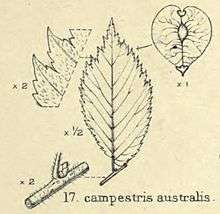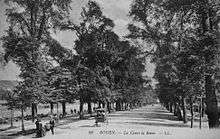Ulmus 'Australis'
The elm cultivar Ulmus 'Australis' [:'southern'], reputedly endemic to south-eastern France, Switzerland and Italy, is a little-known tree considered by various authorities to have been a variety of Ulmus minor or Ulmus × hollandica.
| Ulmus 'Australis' | |
|---|---|
 | |
| Genus | Ulmus |
| Cultivar | 'Australis' |
| Origin | Europe |
'Australis' is not to be confused with Loudon's U. glabra 'Australis', a variety of Wych Elm.[1]
Description
The tree is distinguished by its conspicuously and numerously veined oval leathery leaves measuring 2 inches (5.1 cm) to 3 inches (7.6 cm) in length by 1.25 inches (3.2 cm) to 1.75 inches (4.4 cm) in width and with a petiole up to .25 inches (0.64 cm) long.[2][3]
Cultivation
Augustine Henry described lines of the trees along the Cours-la-Reine in Rouen planted in 1649 by the Duc de Longueville; several of which were still alive in 1912, having attained a height of about 90 feet (27 m). Henry also mentions specimens growing in botanical gardens at Le Mans and Bordeaux, and others growing as far south as Spizza (now Sutomore) in Dalmatia (Montenegro).[3] 'Australis' is not known to survive in cultivation.

Synonymy
- Ulmus campestris (: procera Salisb.) var. australis.[3]
- Ulmus × hollandica 'Australis': Hilliers' Manual of Trees & Shrubs, ed. 4, p. 400, 1977, name in synonymy.
- Ulmus minor 'Italica': Hilliers' Manual of Trees & Shrubs, ed. 4, p. 400, 1977, name in synonymy.
References
- Loudon, John Claudius (1838). Arboretum et fruticetum Britannicum. 3. p. 1398.
- Hilliers' Manual of Trees & Shrubs. (1977). David & Charles, Newton Abbot, UK.
- Elwes, Henry John; Henry, Augustine (1913). The Trees of Great Britain & Ireland. 7. pp. 1904–1905.
External links
- "Herbarium specimen - K000852647". The Herbarium Catalogue. Royal Botanic Gardens, Kew. Sheet labelled U. campestris var. australis Henry from La Mortola, Italy (1913)
- "Herbarium specimen - K000852648". The Herbarium Catalogue. Royal Botanic Gardens, Kew. Sheet labelled U. campestris var. australis Henry from La Mortola, Italy (1913)